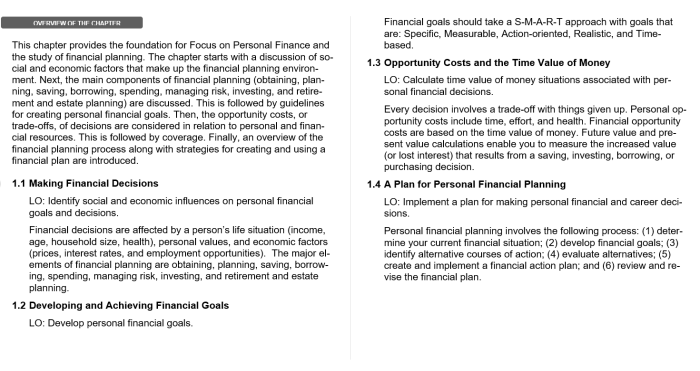Personal finance kapoor 14th edition – Welcome to the realm of personal finance, where Kapoor’s 14th edition serves as an invaluable guide to navigate the complexities of financial planning and decision-making. This comprehensive resource empowers individuals to take control of their financial well-being, offering a wealth of knowledge and practical strategies to achieve financial success.
From understanding the fundamentals of financial planning to mastering retirement strategies and estate planning, this book provides a roadmap for individuals to make informed financial choices and secure their financial future.
Financial Planning Fundamentals

Personal finance encompasses the principles and practices individuals use to manage their financial resources. It involves setting financial goals, creating a budget, managing debt, saving for the future, and making investment decisions. Understanding these fundamentals is crucial for financial stability and well-being.
Setting Financial Goals
- Define specific, measurable, achievable, relevant, and time-bound (SMART) financial goals.
- Consider short-term, mid-term, and long-term goals.
- Break down large goals into smaller, manageable steps.
Creating a Budget
- Track income and expenses to understand cash flow.
- Categorize expenses to identify areas for savings.
- Allocate funds to essential expenses, savings, and investments.
Managing Debt
- Consolidate high-interest debts to reduce interest payments.
- Negotiate lower interest rates with creditors.
- Consider debt consolidation loans or balance transfer credit cards.
Saving for the Future
- Establish emergency funds for unexpected expenses.
- Contribute regularly to retirement accounts, such as 401(k)s and IRAs.
- Explore tax-advantaged savings accounts, such as Health Savings Accounts (HSAs).
Investing Basics
Investing involves allocating funds to various financial instruments to generate returns. Understanding the different types of investments, risk tolerance, and diversification strategies is essential for successful investing.
Types of Investments, Personal finance kapoor 14th edition
- Stocks: Represent ownership in a company and offer potential for capital appreciation and dividends.
- Bonds: Loans made to companies or governments, providing fixed interest payments and principal repayment at maturity.
- Mutual Funds: Baskets of stocks, bonds, or other assets managed by a professional fund manager.
Assessing Risk Tolerance
- Determine how much risk one is willing to take based on age, financial situation, and investment goals.
- Consider factors such as time horizon, income stability, and financial obligations.
- Use risk tolerance questionnaires to assess risk appetite.
Diversification
- Spread investments across different asset classes, industries, and geographic regions.
- Reduce overall portfolio risk by balancing high-risk investments with low-risk ones.
- Consider using asset allocation models to determine optimal diversification.
Retirement Planning
Retirement planning involves preparing for financial security during retirement years. It encompasses saving, investing, and making informed decisions about retirement accounts and other financial products.
Importance of Early Planning
- Time is a valuable asset in retirement planning.
- Starting early allows for compound interest to work in one’s favor.
- Early planning reduces the risk of outliving one’s savings.
Retirement Account Options
- 401(k)s: Employer-sponsored retirement plans with tax-deferred contributions.
- IRAs: Individual retirement accounts with tax-advantaged savings.
- Annuities: Contracts that provide guaranteed income streams during retirement.
Maximizing Retirement Savings
- Contribute as much as possible to retirement accounts.
- Take advantage of employer matching contributions.
- Consider catch-up contributions for those over age 50.
Insurance and Risk Management
Insurance plays a crucial role in protecting individuals and their assets from financial losses. Understanding the different types of insurance and evaluating insurance needs is essential for comprehensive risk management.
Importance of Insurance
- Provides financial protection against unexpected events.
- Safeguards assets and income from losses.
- Provides peace of mind and reduces financial stress.
Types of Insurance
- Health Insurance: Covers medical expenses and protects against financial burdens of healthcare costs.
- Life Insurance: Provides financial support to beneficiaries in the event of the policyholder’s death.
- Property Insurance: Protects against damage or loss to property, such as homes and vehicles.
Evaluating Insurance Needs
- Assess assets and liabilities to determine coverage requirements.
- Consider potential risks and vulnerabilities.
- Compare different insurance policies and premiums to find the best value.
Tax Planning
Tax planning involves understanding tax laws and regulations to minimize tax liability and maximize financial resources. It encompasses strategies for reducing taxes and preparing and filing taxes effectively.
Basics of Tax Laws
- Understand tax brackets, deductions, and credits.
- Familiarize oneself with different types of taxes, such as income tax, sales tax, and property tax.
- Keep up-to-date with tax law changes.
Minimizing Taxes
- Maximize eligible deductions, such as mortgage interest, charitable contributions, and retirement contributions.
- Utilize tax credits to reduce tax liability directly.
- Consider tax-advantaged investments, such as municipal bonds and 529 plans.
Preparing and Filing Taxes
- Gather necessary tax documents and records.
- Choose a tax preparation method, such as using software, hiring a tax preparer, or filing online.
- File taxes accurately and on time to avoid penalties.
Estate Planning
Estate planning involves managing and distributing one’s assets after death. It ensures that wishes are respected, assets are protected, and beneficiaries receive their intended inheritances.
Importance of Estate Planning
- Ensures assets are distributed according to one’s wishes.
- Protects assets from creditors and probate.
- Provides for the care of dependents.
Estate Planning Tools
- Wills: Legal documents that Artikel how assets will be distributed after death.
- Trusts: Legal arrangements that hold and manage assets for beneficiaries.
- Powers of Attorney: Authorize others to make decisions on one’s behalf in case of incapacity.
Ensuring Distribution of Assets
- Create a comprehensive will that clearly states asset distribution.
- Consider using trusts to manage and protect assets for beneficiaries.
- Communicate estate plans with family members and beneficiaries.
Behavioral Finance

Behavioral finance explores the psychological factors that influence financial decision-making. Understanding these biases and heuristics can help individuals make more rational financial choices.
Cognitive Biases
- Confirmation Bias: Seeking information that confirms existing beliefs.
- Overconfidence Bias: Believing one’s financial knowledge and abilities are greater than they actually are.
- Anchoring Bias: Relying too heavily on initial information when making decisions.
Heuristics
- Representativeness Heuristic: Judging the likelihood of an event based on its similarity to past events.
- Availability Heuristic: Basing judgments on information that is easily recalled.
- Affect Heuristic: Making decisions based on emotions rather than objective analysis.
Overcoming Biases
- Be aware of common cognitive biases and heuristics.
- Seek diverse perspectives and information to avoid confirmation bias.
- Use objective data and analysis to support financial decisions.
Questions Often Asked: Personal Finance Kapoor 14th Edition
What are the key principles of personal finance?
The key principles of personal finance include setting financial goals, creating a budget, managing debt, saving for the future, and investing wisely.
How can I assess my risk tolerance for investments?
Assessing your risk tolerance involves considering your age, financial goals, investment horizon, and ability to withstand potential losses.
What are the different types of retirement accounts available?
Common retirement accounts include 401(k) plans, IRAs, and annuities, each offering unique features and tax advantages.
Why is estate planning important?
Estate planning ensures that your assets are distributed according to your wishes after your passing and helps minimize estate taxes.
How can I overcome cognitive biases in financial decision-making?
To overcome cognitive biases, be aware of common biases, gather objective information, seek professional advice when needed, and make decisions based on logic and analysis.